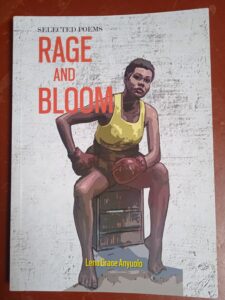I’m a million different people
From one day to the next
I can’t change my mould– The Verve

In ‘Rage and Bloom’, writer and community organizer Lena Anyuolo weaves together a narrative of what it means to feel disconnected, to be enraged, to be revolutionary and finally, triumphantly coming home to yourself in her first collection of incredibly vulnerable poems.
Anyuolo does so through vignettes of her family, lovers and comrades in a style that obscures the boundaries between her personal relationships and revolutionary movements.
Her arc in Rage and Bloom is quite ambitious and uncompromising. Themes of socialism, anti-capitalism, feminism and identity abound in this poetry book as she narrates her many-faceted truths.
The work begins with this profound prologue: “This book is dedicated to the multitudes within me, and the multitudes surrounding me”.
This sentiment creates the perfect introduction to what will become a polyphonic meditation as Anyuolo’s writing continues.
The thirty-six poems in this collection are split into three parts: “Rage, “Transition” and “Bloom.” The segmenting of her poems in such a manner indicates the differences and progression amongst them with emotional contexts overlapping in “Transition”.
One of the poems that stood out keenly for me was “Taifa Hall”. Anyuolo writes: “University students debating colonialism in Tiananmen Square/ Qaddafi’s revolution in Taifa hall/ Opposite Ghandi’s Library/ And America’s wing/ Dwarfed by China’s tower” . “Taifa Hall” speaks to the ideological scramble for Africa and the need for indigeneity and self-determination.
The need to reclaim ownership over one’s body is another theme Anyuolo explores in the poem “I am just a body” “I am neither woman nor man, therefore do not treat me as such”. In the wake of intensified gender essentialist debates around the world, and constant debating and litigating of bodies in the African continent especially queer and women’s bodies as an extension of colonial legacy, this is a form of feminist resistance against these harmful gender binaries.
 The ninth poem in the collection is titled ‘B802’ and addresses the excesses of capitalism and the glaring contradictions of some socialists/Marxists. “We debated class struggle in your BMW X5/ I wondered if a socialist could drive a Benzie/ And flavour their steak with Remy Martin XO/ This is a socialist type of living.”
The ninth poem in the collection is titled ‘B802’ and addresses the excesses of capitalism and the glaring contradictions of some socialists/Marxists. “We debated class struggle in your BMW X5/ I wondered if a socialist could drive a Benzie/ And flavour their steak with Remy Martin XO/ This is a socialist type of living.”
The poem “If They Kill Us” is brief—only 5 lines long: “I do not want a meaningful death!/ I want peace/ To go quietly in my sleep/ Dreaming I am King of a parade of small revolutions/ Within a lifetime of class struggle”.
Perhaps written as a rejection of adventurism, the pursuit of martyrdom and the glorification of pain and sacrifice of oppressed people as if they don’t deserve a long life— which is pervasive in many leftist revolutionary movements. This is playing into the very hands of the oppressors who don’t need us alive.
Anyuolo concludes with the poem “Bloom”. In the last stanza, she writes: “These are my comrades/ My sisters and brothers/ Come/ Let us gather/ To lay the structures for a joyous existence”. It evokes feelings of hope and redemption and this transfers to the reader, as comfort in the knowledge that we are all complex beings seeking peace and belonging.
Anyuolo’s poetic style in Rage and Bloom is defiant and sometimes brazen, yet also beautiful, tender, stunningly creative, imagistic and memorable. An amazing exploration of the multiplicity of self and a call to action to build on care, accountability and solidarity in our revolutionary movements.
Maureen Kasuku is a socialist feminist based in Nairobi and organizing with Feminist Conversations Kenya (FCK). A Capricorn who enjoys dancing to Beyonce and exploring the best Shawarma joints in town.
